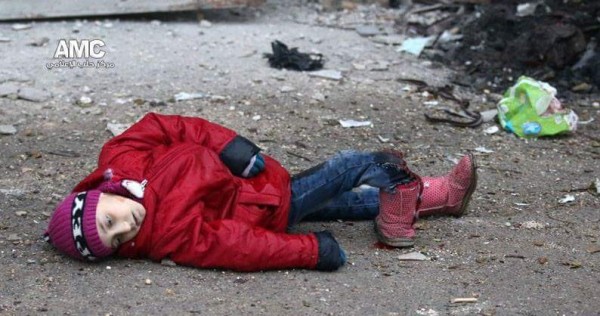PHOTO: Child killed by a regime attack on eastern Aleppo city, November 30, 2016
On Monday, for the first time, the UN Security Council voted for the deployment of international monitors in Aleppo — but only as Syria’s largest city is on the verge of being fully recaptured by foreign forces and Assad regime military and militia units. Since a Russian-regime siege was imposed in late August, thousands of civilians have been killed or wounded, infrastructure and medical facilities have been targeted and destroyed, and an estimated 200,000 people have suffered from shortages of food and basic supplies.
Just before the vote, I answered an inquiry from a reader of The Question, “Why haven’t UN peacekeeping forces intervened in Aleppo?”
In 2012, the UN put in monitors to try to oversee the situation on the ground as the violence escalated, especially the violence from the Assad regime. What happened was very painful for the UN – the monitors were unarmed, and had no backup from any military force. So they were hemmed in by the Assad regime, and blocked from going to any areas they wanted to visit. They also faced a security risk in certain areas of Syria which were becoming effectively lawless, not only because of the regime, but because of some rebel factions. In the end, the monitors were effectively trapped in their hotels, so the UN withdrew them.
Since 2012, the UN has been paralysed, primarily by Russia acting on behalf of the Assad regime. Russia has cast six vetoes on Syria-specific resolutions in the UN Security Council. Some of these have been about a transitional governing authority, but they have generally been pursuing the idea of a halt to the violence, and establishing a political resolution with some type of protection. Russia has stepped in against that, whether we’re talking about no-fly zones, or safe zones, or simply any external authority going into Syria.
If the West had insisted on protected zones, it would have changed the political calculus. It would have drawn a line with the Assad regime, and therefore with the Russians. The question to the Russians and Syrians would have been: do you want this protected zone to be under a force you don’t recognize — outside western countries for example, possibly with the Arab League behind them — or are you willing to have it under UN authority?
But the UN is very wary of sending armed peacekeepers, for fear that it would cause confrontation with local forces, which would lead to a worsening of the situation, rather than an improvement. Also, it would need a Security Council resolution – and even beyond the Russian veto, there are fears of any resolution calling for armed peacekeepers. The most famous reason is Srebrenica – the UN was there, and armed, and was unable to protect the local population. Ever since Srebrenica, and to a lesser extent Rwanda, we have talked about the notion of a ‘responsibility to protect’. But there’s that combination of fears of military escalation, and great power politics within the Security Council.
There are some general parallels between Sarajevo and Aleppo. In both cases, you’ve got a significant group of people within the country who ewant to break away completely, or do not see the governing authority as legitimate. In both cases, the governing authority – Yugoslavia, the Assad regime – has decided on a harsh military response. And in both cases the groups who did not accept the government’s legitimacy eventually took up arms. The difference between Sarajevo and Aleppo is that in Bosnia there was a group that you could identify as a nation, which was seeking to break away.
In terms of humanitarian intervention, we’ve more recently had the intervention of NATO in Libya, which was initially a responsibility-to-protect mission over Benghazi. But that moved towards a regime change intervention, which has really complicated the whole case of Syria. The UN will never want to conduct an intervention which could be seen as supporting regime change.

